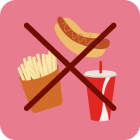Ultra-processed foods. Just reading those words might make you picture neon-colored snacks, fast food, and anything wrapped in plastic. But what exactly makes a food “ultra-processed”—and does that mean you should cut it out completely?
We’re here to break it down without the fear-mongering. No guilt, no food shaming, just the facts so you can make informed choices.
What Are Ultra-Processed Foods, Anyway?
The term comes from the NOVA food classification system, which sorts foods into four categories:
- Unprocessed or minimally processed foods – Whole foods like fresh fruits, veggies, eggs, and unseasoned meats.
- Processed culinary ingredients – Things like salt, oil, and sugar that are used in cooking but aren’t eaten on their own.
- Processed foods – Simple products made with added ingredients, such as canned beans, cheese, and fresh bread.
- Ultra-processed foods (UPFs) – Industrial formulations with ingredients you wouldn’t typically find in a home kitchen, like artificial flavors, preservatives, and emulsifiers.
Ultra-processed foods are often designed for long shelf life, convenience, and irresistible taste. Think packaged snacks, sugary cereals, instant noodles, and fast food.
Are Ultra-Processed Foods Bad for You?
Let’s be clear: eating an ultra-processed food will not instantly ruin your health. But research suggests that diets high in UPFs are linked to increased risks of obesity, heart disease, and other health issues. This is often because they tend to be:
- High in added sugars, unhealthy fats, and sodium
- Lower in fiber and essential nutrients
- Designed to be overconsumed, leading to excessive calorie intake
That said, not all ultra-processed foods are created equal. There’s a big difference between a protein bar with some preservatives and a sugary soda with zero nutritional value.
How to Make Balanced Choices Without Fear
Instead of stressing about avoiding ultra-processed foods completely, try these practical approaches:
- Prioritize whole and minimally processed foods – Make fresh fruits, vegetables, whole grains, and lean proteins the foundation of your diet.
- Read ingredient lists – A long list of unfamiliar ingredients doesn’t automatically mean a food is bad, but watch out for excessive sugar, sodium, and additives.
- Cook more at home – This helps you control what goes into your meals and reduces reliance on processed options.
- Be realistic and flexible – It’s okay to enjoy ultra-processed foods in moderation. A frozen pizza on a busy night won’t undo an overall balanced diet.
The Bottom Line: It’s About the Big Picture
Ultra-processed foods aren’t all evil, but they shouldn’t dominate your diet. The key is balance. If most of what you eat is fresh, nutrient-dense, and minimally processed, there’s room for convenience foods without guilt.
Food should nourish you, but it should also fit your lifestyle. No fear, no shame—just smart, informed choices that work for you.


